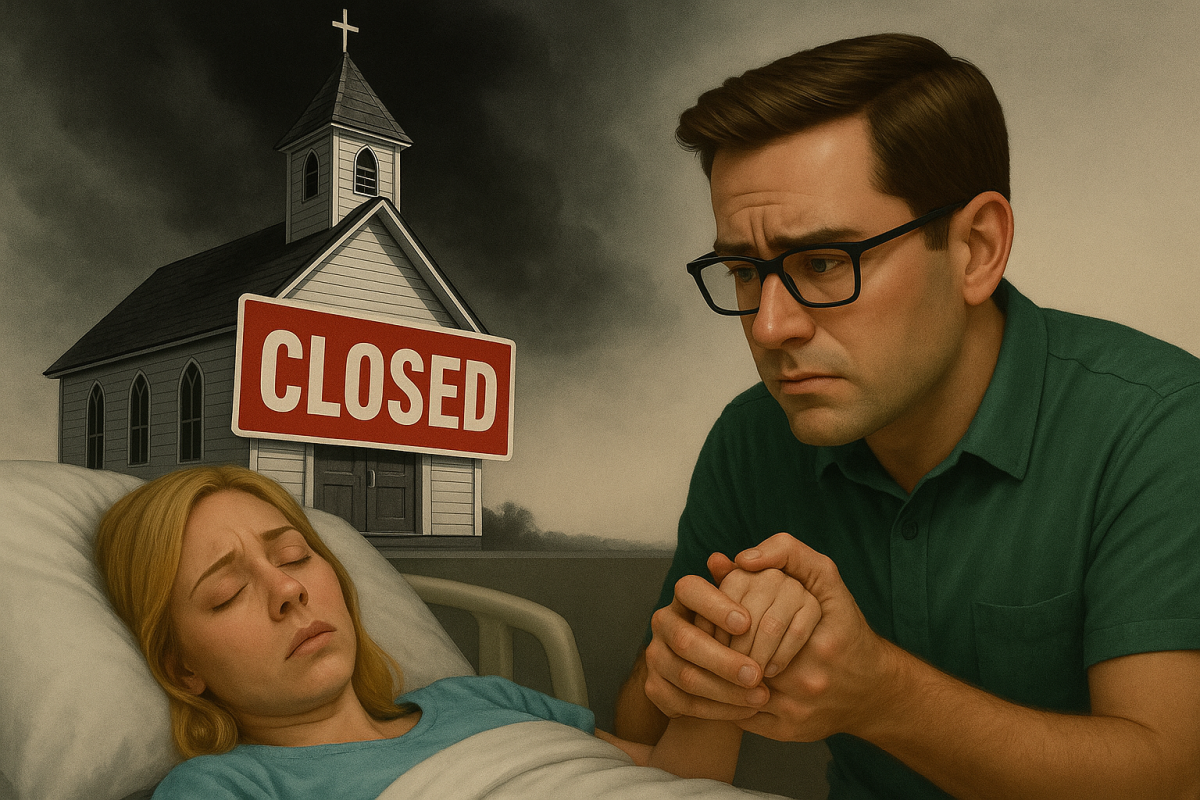There’s a woman on TikTok who’s been conducting a social experiment that should make every church in America deeply uncomfortable. With the sound of a crying baby in the background, she calls up churches and tells them she needs a small bottle of formula. Her baby hasn’t eaten in 24 hours. Can they help?
The responses are depressingly predictable. Some churches tell her they don’t have resources. Others inform her she needs to be a member first. A few redirect her to nonprofits or suggest government assistance. One church even told her “we don’t do that sort of thing.”
I’m sure she’s been criticized for this little stunt. “It’s not real!” “She’s trying to make churches look bad!” “This is entrapment!”
“For I was hungry and you gave me nothing to eat, I was thirsty and you gave me nothing to drink.”
But here’s the thing: this isn’t a social media gotcha. This is Tuesday afternoon in America. Because when real people with real needs knock on church doors, this is exactly what happens.
I know this because I’ve been that person with my hat in my hand, standing at the church door, asking for help.
When my wife was first diagnosed with Crohn’s disease, the medical bills hit us like a freight train. We were in our twenties, five years into our marriage, trying to figure out how to manage a chronic illness while keeping the lights on. We were attending a megachurch at the time—the kind with a coffee bar, a bookstore, and a deacon’s fund specifically designated for people in the congregation who needed help.
So we asked. We needed help with some monthly expenses. In case you were wondering — yes, we had health insurance, but insurance has major limitations when you get diagnosed with something that isn’t curable. For the first few years after her diagnosis, we hit the out-of-pocket max every year.
Before the church would even consider it, we had to meet with a deacon and take a financial literacy class. Because in the mind of evangelicals, obviously, if you need help, you must be terrible with money. Never mind that my wife was spending her weekends either in the hospital, in bed, or curled up on the bathroom floor. Never mind that we were already living as frugally as two people with student loans and entry-level salaries could possibly live. Nevermind that we were tithing 10% of what little we had. Tithing off of our gross, mind you — just like the church had told us to do.
“I was sick and you did not look after me.”
Fortunately, we had already taken the financial class a couple of months earlier, so we just needed one of the deacons to look over our monthly expenses, just like Jesus did when he healed the lame. The deacon looked at our budget, sighed and said “Well, it looks like you’re doing all you can do.” So they gave us the money. I was grateful. I was also humiliated, but mostly grateful.
Then month two rolled around.
That’s when I got the lecture. Our contact at the church informed me that “the Deacon’s Fund isn’t an unlimited supply.” He suggested—helpfully, I’m sure he thought—that maybe I should get a higher-paying job. Or perhaps I could work weekends at a bike repair shop or something.
“If anyone has material possessions and sees a brother or sister in need but has no pity on them, how can the love of God be in that person?”
Let me paint you a picture of our life at that moment: I was working in a management position at a newspaper, which was my professional career, I was only in my late 20s and had worked my way up the ladder to be just two rungs under the publisher. I was working my good Christian tail off to the point where I didn’t have time to look for another job. Meanwhile, my wife was battling a disease that was systematically destroying her body while we frantically tried to figure out how to manage it and keep her alive while trying to deal the mounting medical bills. She was also still working as a teacher at the time.
But sure, let me just pick up a weekend gig fixing bikes. That’ll solve everything.
“I needed clothes and you did not clothe me.”
I hung up the phone in disbelief. It wasn’t the first time the People of God had let me down. It wouldn’t be the last time, but they weren’t going to be given that particular opportunity ever again.
I made a vow right then and there: I would never, ever come to a church with my hat in hand again. And I haven’t.
Now, before you start typing your angry email about how churches have limited resources and can’t help everyone and have to be good stewards and blah blah blah, let me stop you. I get it. I understand that churches aren’t ATMs. I understand that budgets exist and that there are always more needs than resources.
But when your organization is literally founded on the teachings of a man who said his followers would be known by their love—and then you’re turning away a woman with a hungry baby because she’s not on the membership roster—maybe it’s time to ask yourself what exactly you’re doing.
“When you did not do it for one of the least of these, you did not do it for me.”
The American church has become really, really good at buildings, programs, and Sunday morning experiences. We’ve mastered the art of the worship set, the perfectly timed sermon illustration, and the strategic capital campaign. But somewhere along the way, we forgot the basics.
Feed the hungry. Care for the sick. Help people who are drowning.
No membership card required. No financial literacy class needed. No lecture about limited resources or suggestions to get a side hustle.
Just help.
The woman on TikTok isn’t trying to make churches look bad. Churches are doing that just fine on their own. She’s just holding up a mirror and asking: Is this really what we’ve become?
Jesus told a parable once about separating the sheep from the goats. The sheep were the ones who fed the hungry, welcomed the stranger, clothed the naked, and visited the sick. The goats were the ones who didn’t.
The goats had their reasons, I’m sure. Budget constraints. Resource limitations. Membership requirements. The need for proper financial stewardship.
Oh. Another Christian on TikTok got in a lot of trouble a few months ago for simply reading that part of the Bible. Seems the words of Jesus made some Christians really mad. Here are those words:
“Lord, when did we see you hungry or thirsty or a stranger or needing clothes or sick, and did not help you?”
“Whatever you did not do for one of the least of these, you did not do for me.”
So here we are. Churches across America, failing the “What Would Jesus Do?” test while arguing about their reasons why. Meanwhile, people are hungry, sick, and desperate—and increasingly, they’re learning that the church door isn’t the place to knock.
I learned that lesson years ago in a megachurch office, sitting across from a deacon who thought my wife’s illness was a budget problem that could be solved with better time management and a weekend job.
The woman on TikTok asking for formula is just the latest person to learn what many of us already knew: When you need help, you’re better off calling anyone other than the local church.
Jesus wept.

B.T. Clark
B.T. Clark is an award-winning journalist and the Publisher of The Georgia Sun. He has 25 years of experience in journalism and served as Managing Editor of Neighbor Newspapers in metro Atlanta for 15 years and Digital Director at Times-Journal Inc. for 8 years. His work has appeared in several newspapers throughout the state including Neighbor Newspapers, The Cherokee Tribune and The Marietta Daily Journal. He is a Georgia native and a fifth-generation Georgian.



